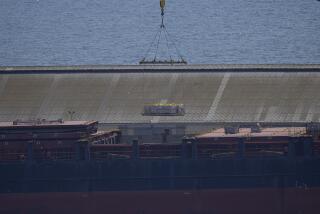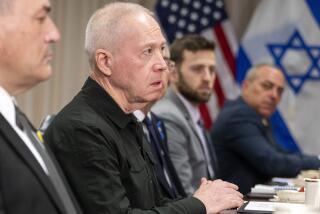Pentagon Acts to Keep Early-Strike Threat Alive : Military: Officials try to offset general’s downbeat comments on readiness. ‘This ain’t no breather for Saddam Hussein,’ one says.
RIYADH, Saudi Arabia — Defense officials on Thursday sought to keep alive the threat of early military action in spite of an Army general’s comments that the U.S. force facing Iraq would not be ready for a Jan. 15 offensive.
Officials at the Pentagon and those traveling with Defense Secretary Dick Cheney in Saudi Arabia on Thursday pointed to an array of forces, including more than 2,000 combat aircraft, that will be in place and ready for war on Jan. 15, the deadline fixed by the United Nations for Iraqi troops to be out of Kuwait.
Marines on the ground and afloat in the Persian Gulf, as well as several muscular U.S. Army units in established positions in Saudi Arabia, would give the United States and its allies “a lot of options,” said Defense Department spokesman Bob Hall at the Pentagon.
“This ain’t no breather for (Iraqi President) Saddam Hussein,” added one official who was traveling with Cheney and Gen. Colin L. Powell, chairman of the Joint Chiefs of Staff. “If I were Saddam Hussein, I would still be concerned about the Jan. 15 deadline.”
In their comments, however, officials acknowledged that the “combined overwhelming air, land, sea campaign” that Powell promised in congressional testimony would not be possible that soon, suggesting that any U.S. offensive might be delayed until February.
At the same time, some officials said that Lt. Gen. Calvin A. H. Waller’s comments Wednesday confirmed that if a war is ordered sooner, its first chapter would rely heavily on U.S. and allied air power poised around the region. In such a case, knowledgeable officials said, the United States would likely mount a series of air strikes that could last for days or weeks before sending in ground troops.
“That’s an option that is clearly ready to go,” said one defense official at the Pentagon.
The officials’ comments came a day after Waller, the deputy commander of all U.S. troops in the Persian Gulf, told reporters traveling with Cheney and Powell that forces there “will not be ready for combat activities” by Jan. 15, any time after which force is sanctioned by resolution of the U.N. Security Council. Waller said that “we should not initiate hostile activities” before the “full complement of forces (is) on the ground.”
Waller’s comments appeared to undercut the effect of threats by President Bush and senior members of his Administration. As recently as Monday, President Bush had said “at midnight (Jan. 15), if he’s not totally out of Kuwait, the United Nations sanctions will be fulfilled.”
In Washington, Administration officials and some lawmakers reacted privately with consternation to the general’s comments. But a Cheney aide described Walker as “a great warrior,” although he said the general erred in discussing his potential advice to President Bush regarding military preparedness.
In an interview with reporters traveling with Cheney and Powell, Lt. Gen. John J. Yeosock, commander of all Army troops in the region, also sought to play down suggestions that the military would not be ready fight on Jan 15.
“I am ready today for whatever mission I am called upon to perform,” the three-star general said. “We have been ready for a considerable period of time.”
He said his battle plan is simple: “I will do everything in my power to apply maximum power in minimum time to make it the highest . . . tempo battle ever recorded. It will be, compared to other operations, a very violent, fast battle.”
Military officials have said that such a fast-war scenario would require that virtually all of the U.S. 430,000 troops slated for duty in the gulf be there and ready to fight. But severe snowstorms in Europe have slowed the deployment of about 200,000 fresh U.S. troops to the gulf.
Other forces, including a U.S.-based aircraft carrier group, will not leave for the area until after Christmas, arriving in the Middle East about a week after the Jan. 15 deadline.
With those delays, many officials familiar with the planning of Operation Desert Shield have stressed early-war scenarios that open with a violent campaign, mounted mainly by aircraft and ship-based cruise missiles, to neutralize Iraqi airfields and sites from which surface-to-surface and air defense missiles are launched.
Following that campaign, heavy Air Force bombers could spend days or even weeks “softening up” Iraqi defenses and fortifications in southern Kuwait. Dropping tons of explosives on Iraqi trenches would decimate and demoralize Iraqi troops that make up the first and second lines of defense. In addition to buying time for U.S. ground forces to take up their positions, the preliminary air war would help weaken Iraqi troops for the onslaught of U.S. and allied ground troops.
Bush Administration officials said Thursday that such talk, including Waller’s controversial comments, may help rather than hinder U.S. efforts to frighten Hussein out of Kuwait.
“It . . . never hurts to build in a little uncertainty about what our intentions are as it relates to Jan. 15,” White House Press Secretary Marlin Fitzwater said.
Healy reported from Washington and Broder from Riyadh. White House correspondent James Gerstenzang contributed to this report.
More to Read
Sign up for Essential California
The most important California stories and recommendations in your inbox every morning.
You may occasionally receive promotional content from the Los Angeles Times.











